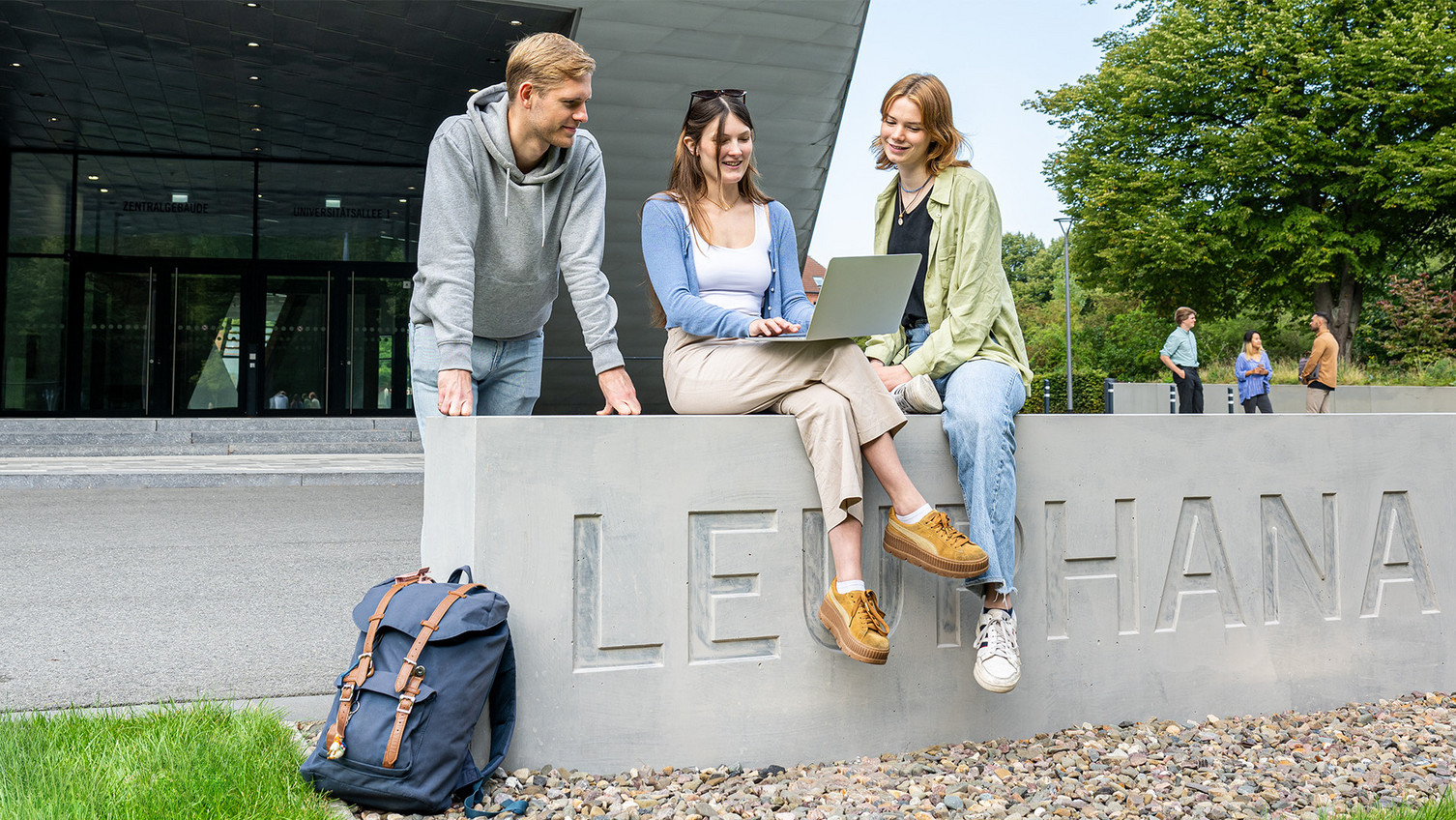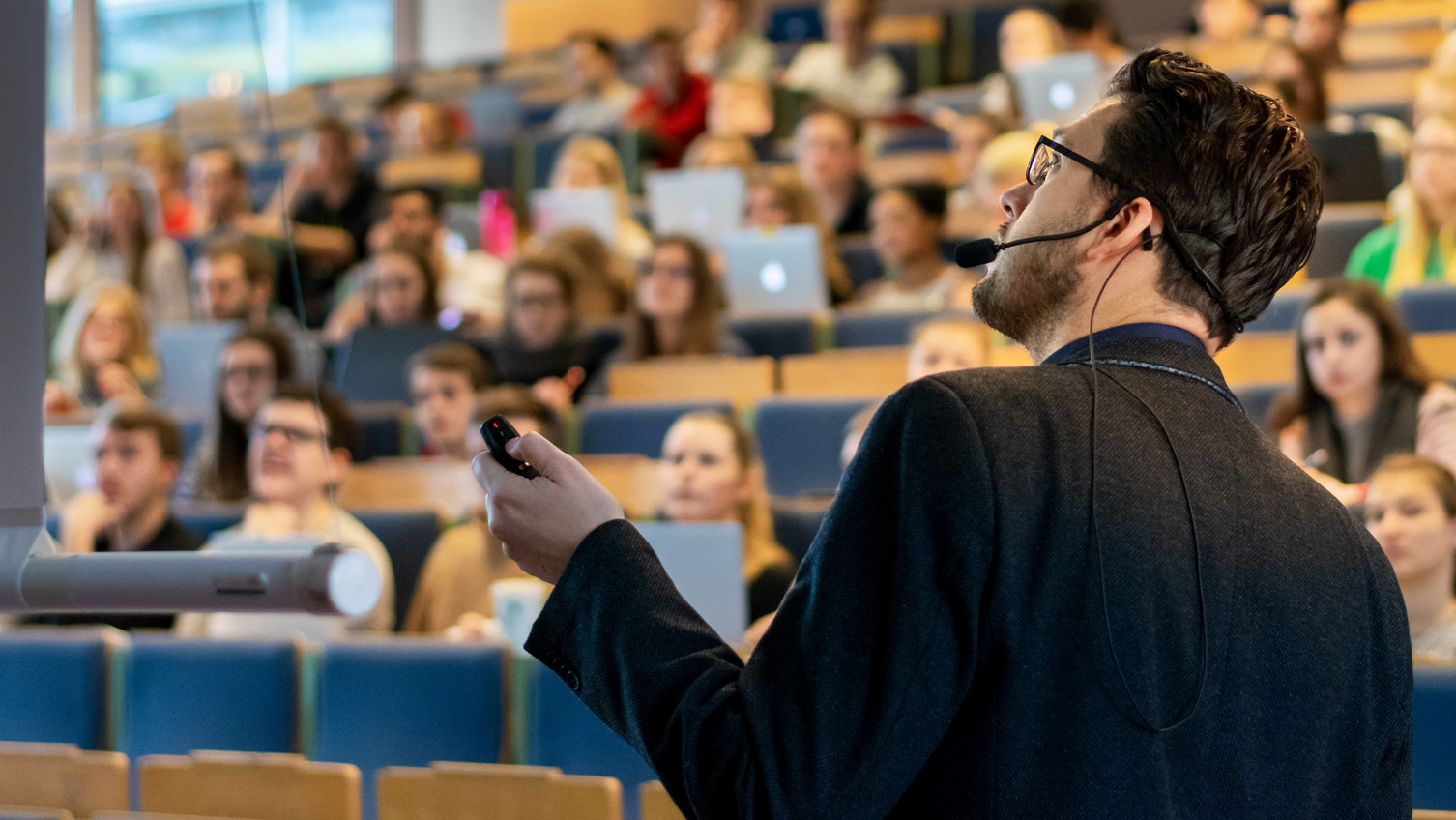Assurance of Learning
Assurance of Learning (AoL) ist ein Qualitätsmanagement-Instrument, das Studienprogramme als Ganzes bewertet. Es ermöglicht zu überprüfen, ob Studierende die Kompetenzen und Fähigkeiten erwerben, die das Programm anbieten soll. Es bewertet niemanden individuell, sondern verbessert das Programm auf der Grundlage dessen, was und wie alle Studierenden lernen.
Im Folgenden bieten wir mehr Informationen zur AoL in zwei separaten Abschnitten: Einer richtet sich an Studierende und einer an Lehrpersonen.
Perspektive der Studierenden
Studierendeninformationen & Beteiligung
 ©Leuphana/Markus Tiemann
©Leuphana/Markus Tiemann
Was bedeutet AOL für dich und warum ist es wichtig?
Der AoL-Prozess (Assurance of Learning) hilft uns dabei, Lehrveranstaltungen anzupassen, Inhalte zu verbessern und sicherzustellen, dass dein Studium auch in einer sich wandelnden Welt relevant bleibt. AoL basiert auf Informationen, die wir in den Studienprogrammen sammeln. Von Zeit zu Zeit kann ein Teil deiner Studienleistungen – zum Beispiel Klausuren oder Projektberichte – sowie die Bachelor- oder Masterarbeiten deines Studiengangs anonymisiert dafür genutzt werden, zu überprüfen, ob die zentralen Kompetenzziele erreicht werden. Für dich entsteht dadurch kein zusätzlicher Aufwand – aber eine externe Perspektive auf deine Arbeit hilft uns, dein Studienprogramm weiter zu verbessern.
Was misst AOL?
Assurance of Learning (AoL) misst, ob Studierende die Kompetenzziele ihres Studiengangs erreichen. Diese Ziele unterscheiden sich je nach Programm, orientieren sich aber alle an vier übergeordneten Dimensionen:
Fachliches Wissen und Expertise: Verstehen und Anwenden zentraler Konzepte deines Fachgebiets.
Wissenschaftliches Arbeiten und Forschungskompetenz: Wissenschaftliches Denken, kritische Analyse und fundierte Forschung.
Unternehmerisches und lösungsorientiertes Denken: Entwicklung innovativer und praxisnaher Lösungsansätze für Herausforderungen.
Verantwortungsvolles Management: Anwendung ethischer Prinzipien und Nachhaltigkeitswerte in unternehmerischen Entscheidungen sowie Umgang mit komplexen gesellschaftlichen und organisatorischen Herausforderungen.
Wenn du die konkreten Lernziele deines Studienprogramms kennenlernen möchtest, findest du diese weiter unten in den ausklappbaren Abschnitten.
Wie kannst du dich einbringen?
Der beste Ort, um deine Wünsche, Anregungen und Fragen zum Studium zu äußern, ist der Qualitätszirkel deines Studienprogramms. Dieser findet einmal jährlich statt, und alle Studierenden deines Bachelor- oder Masterprogramms werden über myStudy eingeladen. Bei diesem Treffen mit Lehrenden und Koordinator:innen kannst du Feedback geben, Ideen austauschen und dein Studienumfeld aktiv mitgestalten. Du musst kein:e Expert:in sein – bring einfach die Perspektive deiner Jahrgangsgruppe mit.
AoL trägt dazu bei, Studiengänge besser, gerechter und zukunftsfähiger zu machen. Mach mit und gestalte die Zukunft deines Studiums mit – mach deine Stimme hörbar!
Wenn du nicht am Qualitätszirkel teilnehmen kannst oder ein dringendes Anliegen zur Qualität deines Studienprogramms hast, schreib uns gerne eine E-Mail an: aol@leuphana.de.
Hier sind die Kompetenzziele für Dein Studienprogramm:
Knowledge and understanding: Students demonstrate integrated academic knowledge and understanding of business information systems.
The student has solid knowledge on core theories, concepts, and models in (business) information systems.
The student reflects on the limits of theories, concepts, and models.
The student applies academic concepts and theories to practical and/or theoretical problems in (business) information systems.
Academic skills: Students master basic scientific working techniques and justify their own decisions and steps of action.
The student poses relevant research questions.
The student develops appropriate research and/or development design.
The student applies research and/or development methods to draw theoretical and/or practical conclusions.
Solutions for complex problems: Students develop and evaluate solution-oriented propositions.
The student outlined the relevance of the problem statement or research question for its context.
The student appropriately developed specific concepts or artifacts (e.g. an algorithm, a model, a program) for implementation.
The student discussed how the solution contributed to research and advanced the knowledge in the respective field.
Knowledge and expertise: Students critically reflect and apply academic knowledge in the field of management and entrepreneurship.
The student has profound knowledge on core theories, concepts, and models of the field of management and entrepreneurship.
The student applied scientifically based theories, concepts, models, and methods, to practical and/or theoretical problems.
The student recognizes and understands how systems are embedded within different domains and different scales, analyses complex systems, and deals with uncertainty.
Academic skills: Students work independently in an academic context and justify and reflect on their own actions.
The student knows and understands relevant data and its availability.
The student chose and applied a sophisticated and/or specialized research design.
The student critically reflects on applied theories and methods as well as their own conclusions.
Entrepreneurial thinking: Students develop and evaluate solution-oriented propositions.
The student outlined the relevance of the problem statement or research question from a theoretical and practical perspective.
The student discussed the implications of the topic and/or the findings for theory and practice.
The students developed (and implemented) innovative solution options that further innovative activities.
The student developed convincing propositions for solving the project tasks.
Responsible management: Students act responsibly in their decision-making.
The student critically reflects on the relations between business and society: The student has profound knowledge of responsible management and identifies important aspects concerning responsible management in a given situation.
The student considered principles and/or practices of responsible management: The student negotiates (sustainability) values, principles, goals, and targets, in a context of conflicts of interests and trade-offs, uncertain knowledge and/or contradictions.
Knowledge and expertise: Students critically reflect and apply academic knowledge in the field of sustainable accounting and finance.
The student has profound knowledge on core theories, concepts, and models of the field of sustainable accounting and finance.
The student applied scientifically based theories, concepts, models, and methods, to practical and/or theoretical problems.
The student recognizes and understands how systems are embedded within different domains and different scales, analyses complex systems, and deals with uncertainty.
Academic skills: Students work independently in an academic context and justify and reflect on their own actions.
The student knows and understands relevant data and its availability.
The student chose and applied a sophisticated and/or specialized research design.
The student critically reflected on applied theories and methods as well as their own conclusions.
Entrepreneurial thinking: Students develop and evaluate solution-oriented propositions.
The student outlined the relevance of the problem statement or research question from a theoretical and practical perspective.
The student discussed the implications of the topic and/or the findings for theory and practice.
The students developed (and implemented) innovative solution options that further innovative activities.
The student developed convincing propositions for solving the project tasks.
Responsible management: Students act responsibly in their decision-making.
The student critically reflects on the relations between business and society: The student has profound knowledge of responsible management and identifies important aspects concerning responsible management in a given situation.
- The student considered principles and/or practices of responsible management: The student negotiates (sustainability) values, principles, goals, and targets, in a context of conflicts of interests and trade-offs, uncertain knowledge and/or contradictions.
Scientific research competences: Contributions to complex theory.
The student devised an appropriate formalization of the problem.
The technical contribution is innovative and conceptually novel.
The technical contribution or theses contributes to a complex theory.
The mathematical derivation of the technical contribution is correct.
The empirical evaluation supports the claims of the thesis.
Skills for analyzing problems and developing solutions: Students develop solutions based on a thorough analysis which considers contextual specifics.
The student puts the thesis adequately in context with related scientific work.
The student puts the thesis adequately in context with related practical work.
The student developed convincing propositions for solving the project tasks.
Disciplinary expertise: Students apply theoretical knowledge on questions/challenges in the field of modern production systems and production technology (industry 4.0).
The student is able to define and interpret terminologies, specific topics, limitations, and common discourses of modern production systems and production technology.
The student is able to think and act logically in their field.
The student is able to apply scientifically based concepts, theories, models and methods to practical and theoretical as well as past, present and future problems.
Scientific competences: Students demonstrate high standards of applying appropriate methods for research and development.
The student knows with which method they obtain relevant data.
The student applied sophisticated and/or specialized methodologies or approaches.
The student performed rigorous data analysis.
Solutions for complex problems: Students develop and evaluate solution-oriented propositions.
The student develops solutions for complex interdisciplinary challenges in the context of global transformations and specifically digitalization.
The student discussed how the solution contributed to research and advanced the knowledge in the respective field.
The student developed convincing propositions for solving the project tasks.
Perspektive der Lehrpersonen
Beratung & Unterstützung
 ©Leuphana/Kersten Benecke
©Leuphana/Kersten Benecke
Was ist Ihre Rolle im AoL-Prozess?
Als Lehrperson besteht Ihre Rolle im Rahmen der Assurance of Learning (AoL) darin, zu bewerten, inwieweit Studierende die Kompetenzziele ihres Studienprogramms erreichen.
Alle von Ihnen betreuten Bachelor- und Masterarbeiten müssen im Hinblick auf die Kompetenzziele des Programms beurteilt werden. Dafür erhalten Sie automatisch eine E-Mail mit der Einladung, die jeweilige Abschlussarbeit im Rahmen einer Umfrage zu evaluieren. Wird eine von Ihnen gelehrte Veranstaltung für die AoL-Evaluation ausgewählt, werden Sie gebeten, Ihre Studierenden zusätzlich mithilfe eines separaten AoL-Erhebungsbogens zu bewerten. Diese AoL-Evaluation ist unabhängig von der regulären Notengebung und dient ausschließlich der Qualitätssicherung auf Programmebene.
Dr. Lotte Lutz aus dem Team des Dekanats unterstützt Sie während des gesamten Prozesses und steht bei Fragen unter aol@leuphana.de zur Verfügung.
Wie sieht der AoL-Zyklus aus?
Der AoL-Zyklus folgt einem strukturierten Qualitätssicherung- und Entwicklungsprozess. Zunächst werden für jedes Kompetenzziel eines Programms messbare Lernziele definiert. Anschließend wird die Leistung der Studierenden in ausgewählten Modulen und anhand aller Abschlussarbeiten nach diesen Kriterien bewertet. Die gesammelten Daten werden analysiert, um Verbesserungsbedarfe zu identifizieren. Diese Erkenntnisse fließen in das kontinuierliche Qualitätsmanagement und die Weiterentwicklung der Curricula ein. Ein zentraler Ort zur Diskussion und Entwicklung von Verbesserungen ist der Qualitätszirkel jedes Studienprogramms. Die Wirkung der umgesetzten Maßnahmen wird in zukünftigen Zyklen durch erneute Erhebungen überprüft.
Welche Daten werden erhoben – und wie?
Es gibt mehrere zentrale Datenquellen: Die Evaluation von Abschlussarbeiten (Bachelor, Master, Promotion) ist eine der Hauptquellen. Hier bewerten Betreuende die Lernergebnisse anhand der Kompetenzziele. Dafür werden Sie per E-Mail zur Evaluation in einem online-survey eingeladen. Diese E-Mail kommt möglicherweise etwas zu früh, da wir nicht wissen, wann Sie die Arbeit begutachten. Wir versenden auch eine automatische Erinnerung nach 2 Wochen. In ausgewählten Modulen beurteilen Lehrende die Leistungen der Studierenden auf Basis spezifischer Lernkompetenzen. Hierfür wenden wir uns persönlich an Sie. Formate wie Qualitätszirkel liefern zusätzlich kontextbezogene Informationen.
Was passiert nach der Datenerhebung?
Nach der Erhebung werden die Daten analysiert und gemeinsam mit Studiengangsverantwortlichen und Lehrenden besprochen. Sie bereichern die Diskussion im Qualitätszirkel. Die Ergebnisse fließen in die Weiterentwicklung der Studienprogramme ein – etwa durch Anpassungen im Curriculum oder in der Lehrkoordination. So wird sichergestellt, dass die Programme weiterhin auf ihre angestrebten Kompetenzziele ausgerichtet sind und sich auf Grundlage der Lernergebnisse kontinuierlich weiterentwickeln.
Curriculum Mapping an der School of Management and Technology
Mit einem Curriculum Mapping lässt sich sichtbar machen und nachvollziehen, wie einzelne Lehrveranstaltungen zur Erreichung der übergeordneten Kompetenzziele eines Studienprogramms beitragen. Es hilft dabei zu erkennen, welche Kompetenzen abgedeckt werden, wo es Überschneidungen gibt und an welchen Stellen mögliche Lücken bestehen. An der School of Management and Technology unterstützt Curriculum Mapping sowohl die Qualitätssicherung als auch die Weiterentwicklung der Studienprogramme, indem es die Struktur von Lehre und Lernen transparenter macht. Es ergänzt das Assurance of Learning (AoL)-System und bildet eine Grundlage für fundierte Entscheidungen in der Curriculumsplanung und -optimierung.
Downloads
Möchtest du mehr über Aol erfahren? Dann bist du hier genau richtig!
Kontakt & Feedback
Wir freuen uns auf Ihre Rückmeldungen.
Bei Fragen, Anregungen oder Anliegen rund um Lehre und Programmkoordination wenden Sie sich bitte an die zuständige Kontaktperson:
AOL Process:
- Dr. Lotte Lutz
Bachelor Programs Business and Management:
- Anja Roß
Bachelor Programs Engineering and Information Systems:
- Hanka Majewski
Master Programs Management:
- Julia Oehmichen
